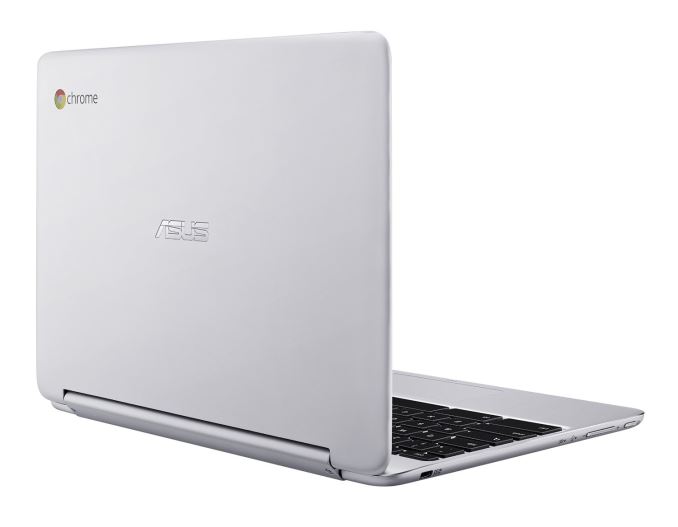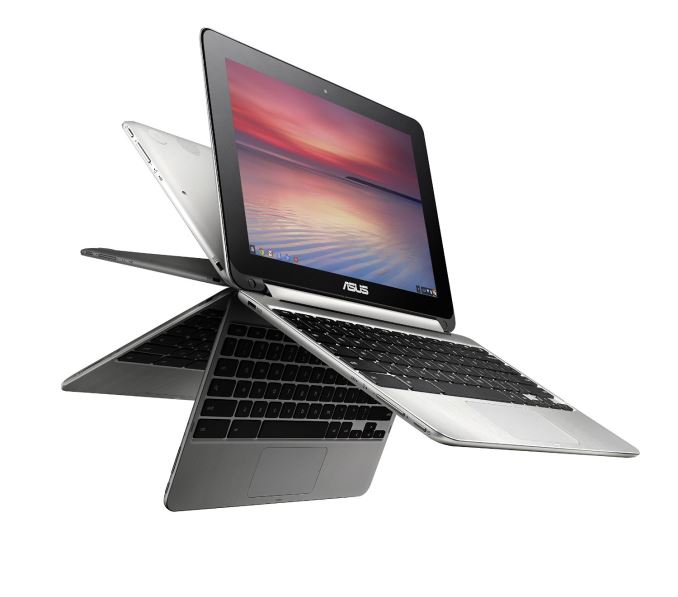ASUS Releases Convertible ChromeBook Flip C100
by Brett Howse on July 20, 2015 6:15 PM EST- Posted in
- Chromebook
- Asus

Today ASUS is launching a new Chromebook, but this one gets the flip treatment with a 360° hinge. According to ASUS, it brings together the experiences of a tablet and notebook into one device. We’ve certainly seen a lot of these on the Windows side, but for a device packing Chrome OS, this is certainly less common if not unique.
Let’s go over what is inside. ASUS turned to Rockchip for the processor on this device with the Rockchip 3288-C SoC inside. This is a quad-core design based on the Cortex A17, and clocks in at 1.8 GHz. The GPU is the ARM Mail T624, and you can get either 2 or 4 GB of system memory and 16 GB of eMMC storage. It also supports a SD/SDXC card reader if you need to add a bit more storage.
Although the internals are certainly low end, ASUS did put a multi-touch IPS display in, albeit at only 1280x800 resolution, but for the 10.1” low cost device, that is likely serviceable. There are also outputs for HDMI if necessary and of course a headset jack. There are two USB 2.0 ports for connectivity, and the battery is rated for up to nine hours.
| ASUS ChromeBook Flip C100 | |
| Processor | Rockchip 3288-C Quad-core Cortex A17 @ 1.8 GHz ARM Mali T624 GPU |
| Connectivity | 802.11ac Bluetooth 4.1 |
| Memory | 2G or 4GB DDR3L |
| Storage | 16GB eMMC |
| Battery | 2-cell up to 9 hours |
| I/O | 2 x USB 2.0 HD webcam micro HDMI Headphone/mic jack SD Card reader |
| Dimensions | 10.35" x 7.18" x 0.6" / 263 x 182 x 15.2 mm |
| Display | 10.1" 1280x800 IPS LCD with capacitive touch |
| Weight | 1.96 lbs / 0.89 kg |
| Price | $249/$299 for 2GB/4GB |
The keyboard is 97% of a full-sized notebook keyboard, so despite the small size it should be reasonable to type on.
Speaking of size, the 0.6-inch body weighs in at just under two pounds, so it should be easy to tote around. That’s nothing like what an actual tablet weighs of course, but for a small notebook it is very light.
My biggest concern with the ChromeBook Flip C100 is the operating system though. Windows devices have been sporting these convertible designs for some time, but Windows 8 was built with touch as a primary input device, and although the Windows store is not as fleshed out as the iOS tablet store, it is certainly more fleshed out that Chrome OS as a tablet OS.
If you are interested in kicking the tires on one of these, they are available now from the ASUS eStore, Newegg.com, and Amazon.com for $249 (2GB) or $299 (4GB).
Source: ASUS

















46 Comments
View All Comments
Brett Howse - Tuesday, July 21, 2015 - link
My comment was that Chrome OS is not a tablet OS, and this device converts into a tablet. If and when there is more Android apps support this will likely not be an issue but it's usability as a tablet is certainly diminished by running Chrome OS and not Android. Still, for $249 it's a thin and light Chromebook with an aluminum build and an IPS display.Impulses - Tuesday, July 21, 2015 - link
Which is perfectly fair, and even tho I and others porpose Android as a more capable solution, you could say the same thing but backwards about it... It's really not made with a keyboard in mind. That's what makes Google's whole strategy with both OS so confusing IMO.uhuznaa - Tuesday, July 21, 2015 - link
There's VERY little Google would have to add to Android to make it work great with laptops. Honestly, just view Android as a Linux version with lots and lots of available apps. Including games and even MS Office now. Adding better keyboard and mouse/trackpad support would be a piece of cake. In fact just an Alt-Tab task-switcher would be nearly enough to make it the best supported small-laptop Linux ever. I really would love to buy this tablet/netbook if it would run Android. It almost cries for becoming the next Nexus 10.I mean, there must be something between full crappy Windows and ChromeOS. Just give me Android with a decent keyboard and a not too small display please. This thing is actually lovely.
I think Google is shrinking back from really attacking MS. Google does not want to fling itself into a position in which it would be subject to all the monopoly sensibilities that this would entail and so it leaves a really huge gap between Android and ChromeOS for MS to fumble around in. Google doesn't dare and this actually makes me furious. This it not the way to change the world.
Impulses - Tuesday, July 21, 2015 - link
You could say all those things about a Nexus device if you were to use it in the same limited way (almost no downloads, everything online, etc)... Chromebooks seem like a nice concept for some limited markets, but it leaves a lot of capabilities on the table and confused their overall strategy IMO.lmcd - Tuesday, July 21, 2015 - link
I don't even dislike ChromeOS for what it is, but why are all these Google Evangelists proclaiming Chrome OS's superiority?Yes, I own one.
It only gets used for Youtube, Facebook, and other around-the-house browsing. Google Docs is prone to locking up with even the slightest hint of connection malfunction, as the average person's home wireless is likely to exhibit. Furthermore, Docs' formatting tools simply lack any sort of flexibility or power.
Chrome OS offline? Still takes much more configuration than anyone wants to admit here -- the users taking advantage of its "simplicity" likely will never find out this functionality on their own. Trust me, I live with one of those users. Since acquiring the Chromebook, it remains in use around the house but has nearly never ventured beyond WiFi range, and for good reason. And despite having configured Google Cloud Print, that feature too has gone unused due to the lack of Office.
I don't know what mental switch it takes to want to take the harder path here. Chrome OS simply trades too many conveniences for little in return. Even Windows RT remains a better option, particularly with the Tegra 4 found in the Surface 2. And given the availability of cheap Atom-based Windows 8.1 laptops, ChromeOS makes little sense.
This is amplified when considering the use-case of a Chromebook further versus that of the Windows 8.1 laptop. For instance, the HP Stream 11 brings a year of Office to the table, compared to two years of Google Drive. But after that year, the HP Stream still has Office Online, which is equal to Google Docs at this stage in the game. And given that both devices likely require a subscription to an online storage service, and Office 365 includes storage for around the same price as Drive (which possesses no boost to office productivity), the choice is clear.
I haven't even factored in the device compatibility, the huge difference in software availability, or the strength of the Windows Store (which at this point has many key apps, and is only looking upward with Windows 10). So many commenters here ask why Chrome OS is being dismissed. "The usual comments." The problem is, many of those comments are still accurate.
damianrobertjones - Thursday, July 30, 2015 - link
The re-sale value on these things, on ebay, is pretty darn poor.16GB storage? Baaa haa haa.